1. SF Express’s new regulation of “receipt confirmation plus one yuan” was questioned, and the Zhejiang Provincial Consumer Insurance Commission issued a document questioning SF Express’s alleged charges for setting up a name. SF Express responded that the service is a common practice in the express delivery industry, and it is not necessary to choose if it is not approved. Media surveys show that more than 85% of netizens object to the charge for “signature confirmation” and believe that “signature confirmation” should be the legal obligation of the express company.
2. Behind the collection of “signature confirmation” fees, SF Express’s performance is under pressure. In the first half of the year, net profit fell nearly 80% year-on-year, and in the first quarter it lost 989 million yuan. SF’s stock price has also fallen all the way. Since mid-February, SF’s stock price has been cut in half, and its market value has evaporated by nearly 300 billion yuan from its highest point.
3. The “price war” of domestic express companies has been going on for a long time, but recently they have collectively announced price increases. Xie Xiaowen, a special researcher of the Chinese Society of Logistics, told Phoenix.com “Eye of the Storm” that whether it is value-added services or price increases, it sends a signal that express companies no longer take low prices to occupy the market as their main goal, but to improve service quality and obtain More profit-oriented, seeking better development.
4. Phoenix.com “Eye of the Storm” also found that in addition to SF Express, YTO Express, Zhongtong, and JD Express have also launched various “value-added services” in recent years. However, only SF’s value-added services have “receipt confirmation”. The Beijing Youth Daily commentary pointed out that it is necessary to be particularly vigilant for express companies to cover up the illegality of arbitrary charges based on “industry common practices” and “customers have demand”.
Recently, express delivery giant SF Express has been a bit burnt. The embarrassing results in the semi-annual report have not yet eased, and the “sign for confirmation fee” has pushed it to the forefront.
Recently, the Zhejiang Provincial Consumer Protection Committee (abbreviated as Zhejiang Consumer Protection Committee) issued a document on its official platform, questioning SF Express 1 yuan to sign and confirm value-added services, believing that this action is suspected of infringing on consumer rights by setting up a name for charging.
In response, SF Holdings responded: “This password signing service first originated from the special needs of jewellery, 3C electronics and luxury customers. In addition to the regular delivery signing, such customers also hope that our company It can provide value-added services for verifying the 6-digit password information or the last 6 digits of the recipient’s ID number to ensure that the express is signed and received by the recipient designated by the sender’s customer, and to avoid transaction disputes after misdelivery or proper delivery of the express.”
Many users are worried about whether unchecking this service will affect the normal delivery of express delivery. The staff said, “Whether users choose this value-added service will not affect the normal delivery of express delivery. Usually only when the sender has special needs. Will choose.”
Express logistics expert Zhao Xiaomin also told Phoenix.com “Eye of the Storm”: “Strictly speaking, this service is a mutual recognition of information carried out by the sender to ensure the safe delivery of valuables, to ensure that the recipient and the sender confirm Consistent, it is a customized service and has nothing to do with a price increase.”
“First of all, this service is for the sender, and you can choose whether to check it or not. Second, this service is generally prepared for high-value items such as jewelry and watches. It is similar to the express delivery function and has no effect on ordinary customers. Three points, this service is a common option in the international express delivery industry, and it is a customized service that guarantees safe delivery. On the whole, this is not a price increase, but a customized service.” Zhao Xiaomin believes.
However, it seems that the nature of the item is not marked in the “Receipt Confirmation” column of the SF app value-added service.
Facing the dispute, SF Express argued that this value-added service is also a common practice in the express delivery industry. However, “Eye of the Storm” on Phoenix.com found that several other mainstream express companies such as Zhongtong, Yunda, and JD Logistics did not find “signature confirmation” or similar services.
In fact, as early as May 1, 2018, the “Interim Regulations on Express Delivery” Chapter 4 Article 25 also clearly stipulates the responsibilities and obligations of express delivery services. Enterprises operating express delivery services should deliver express mail to the agreed The recipient’s address, recipient or the recipient designated by the recipient, and inform the recipient or the recipient of the acceptance in person. The recipient or the consignee has the right to check and accept in person. In other words, “sign for confirmation” is the basic obligation of express delivery companies.
The Zhejiang Consumer Protection Committee stated that it has separated the “signature confirmation” from the due statutory service content, and is suspected of cleverly establishing a name for the fee. In terms of form, it is also easy for consumers to misunderstand that if this service item is not checked, the company may not provide the “sign-for confirmation” service, which may be misleading.
Not only the Zhejiang Consumer Protection Committee, but also netizens are not buying it. SF’s “receipt confirmation fee” immediately topped the hot search on Weibo. As of September 13, the entry “SF responded to the receipt of confirmation plus one yuan” had been read 380 million, and nearly 7,000 people expressed their opinions.
Some netizens said: Express delivery should be delivered to the door, or agreed to be placed in the express cabinet, there should be no extra charge. There are also consumers complaining: I can’t do this even if I lack money. Is SF Express crazy?
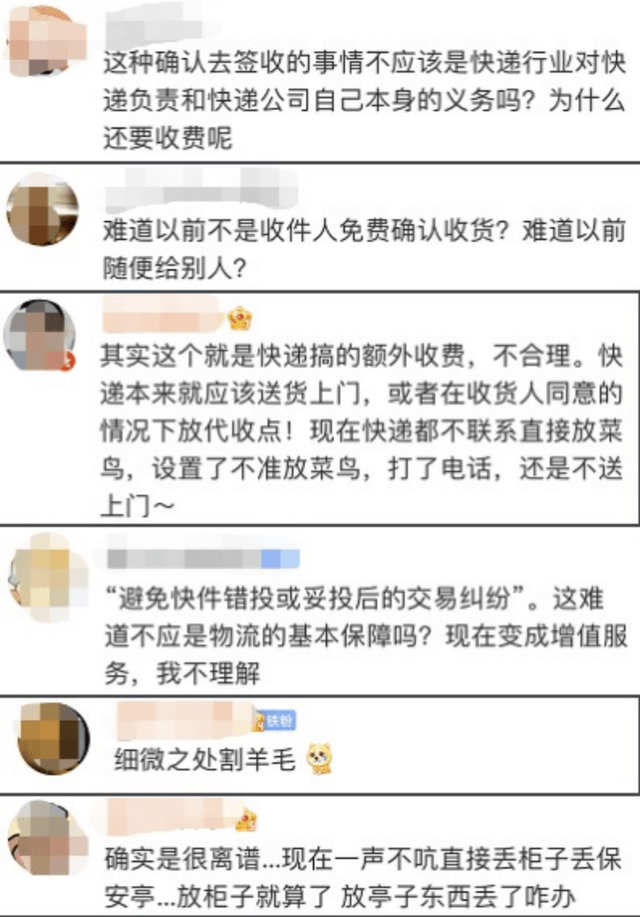
However, some netizens are in favor of such value-added services when mailing valuables.
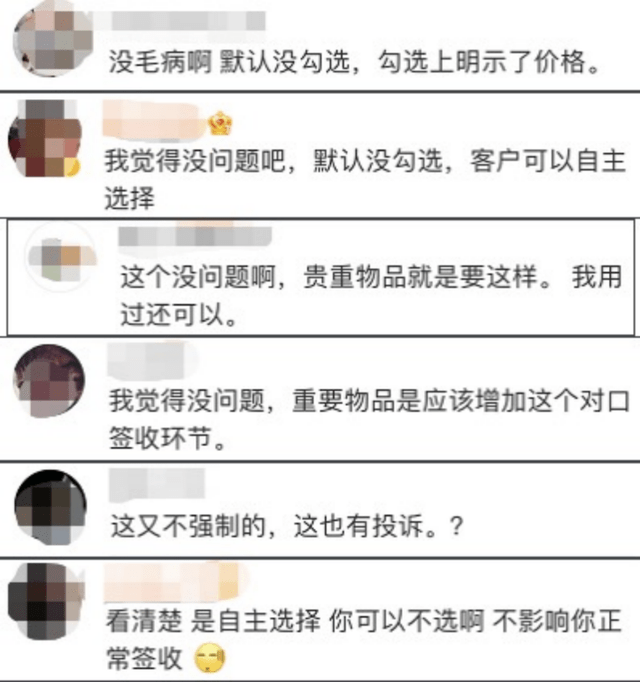
There are still some consumers who are indifferent to this. Some consumers said to Phoenix.com’s “Eye of the Storm”: “It’s only one yuan, and it’s not compulsory, so it doesn’t feel much.”
The “Eye of the Storm” of Phoenix.com found that in a poll conducted by China Consumer News on this matter, more than 85% of netizens chose to oppose the charge of “signature confirmation”, believing that the “signature confirmation” should belong to the express company. Statutory obligations.
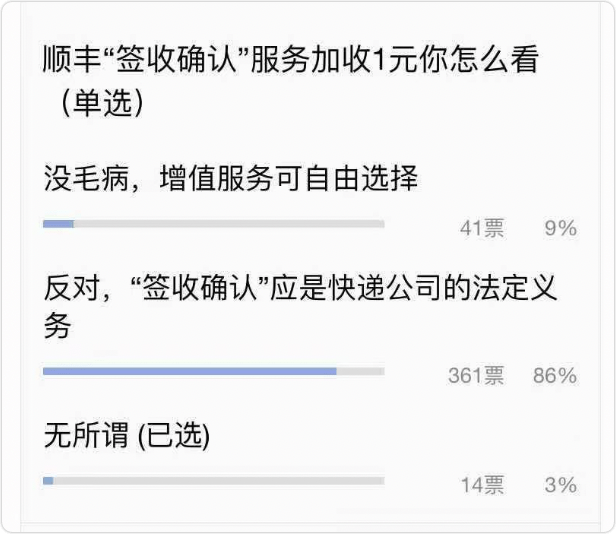
In response to this matter, the Beijing Youth Daily published a commentary article saying: “Does the “industry common practice” mean legal and reasonable? Obviously not. If all express companies do this, it can only show that there is a widespread problem of indiscriminate charges in the industry, and more consumers may be misled by express companies to pay for such arbitrary charges. This is another mess that the express delivery industry does not “make a license” in accordance with laws and regulations, which infringes on the legitimate rights and interests of consumers.
Net profit fell by 80% in the first half of the year, and the share price of “Express One Brother” was cut in half
Although it is ugly to eat, it is not difficult to understand SF’s anxiety by looking through the half-year earnings report released by SF Express on August 23.
The report shows that from January to June 2021, SF Express’s revenue was 88.3 billion yuan, an increase of 24.2% year-on-year. The net profit attributable to shareholders of listed companies was 760 million yuan, a year-on-year drop of 79.8%. At the same time, basic earnings per share/diluted earnings per share also fell by 80%.
Regarding the performance of the financial report, SF Express explained that there are three reasons: one is the increase in costs caused by the investment of resources, the second is the significant increase in employee compensation costs, and the third is that the proportion of economic express products with relatively low pricing has increased too fast. Lead to pressure on gross profit.
According to data, in 2020, revenue of 154 billion, outsourcing cost 81.9 billion, employee compensation 24.3 billion, transportation cost 14.3 billion, the three major costs together account for 78.3% of revenue. In the first half of 2021, revenue of 88.3 billion, outsourcing costs of 51.8 billion, employee compensation of 13.2 billion, and transportation costs of 9.6 billion, the three major costs together accounted for 88.4% of revenue. From the perspective of the proportion, the increase in cost and employee compensation costs is obvious.
Due to the decline in net profit, a loss of 989 million yuan in the first quarter, SF’s stock price also fell all the way. Since February 18, SF’s stock price has been cut in half, and its market value has evaporated by nearly 300 billion from its highest point.
As of the close on September 13, SF Holdings’ stock price was 61.85 yuan, down 1.73% that day, and the total market value was 281.8 billion yuan.
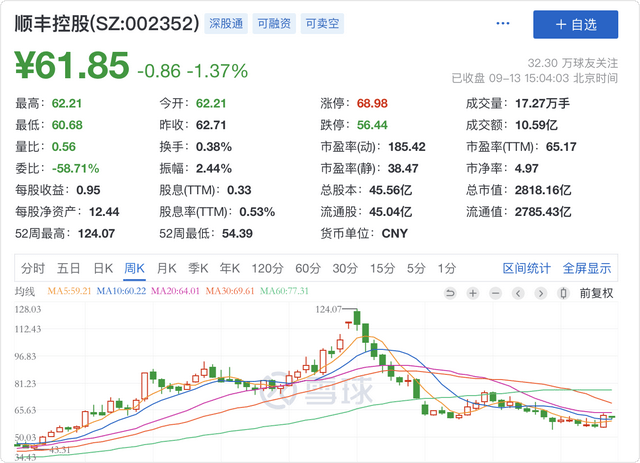
Before 2021, SF Express, as the “first brother of express delivery”, can be described as dazzling in terms of performance and stock price.
In 2020, SF’s revenue was 153.987 billion yuan, a year-on-year increase of 37.25%, and its parent net profit was 7.326 billion yuan, a year-on-year increase of 26.39%. SF Express achieved a net profit of 7.3 billion yuan with a market share of less than 10%, which is almost equal to the total net profit of Santong Yida with a market share of over 60% (7.6 billion yuan).
At the same time, the company’s stock price has soared. From June 2019 to mid-February 2021, SF Express has risen by more than 310%, and its market value has increased by hundreds of billions.
As for the decline in profits, SF’s head Wang Wei seems to have expected it. He once said at the beginning of the year, “If short-term profit pressure can be exchanged for long-term competitiveness, SF Express will have the opportunity to become an indispensable choice in the market. , That is willing to lower the profit margin expectations for the next 1-2 years. This is an important strategy.”
Courier companies collectively increase prices, SF Express or out of the “price war”?
In addition to some of its own factors, the continued “price war” in the express delivery industry is also a factor that cannot be ignored.
Phoenix.com “Eye of the Storm” learned that the “price war” in the express delivery industry has intensified in recent years, and major express companies have adopted the strategy of “price-for-quantity” to maintain their market share.
In 2020, after Jitu Express, established in Indonesia, entered the Chinese market, the price war intensified.
Official data show that in less than one year after entering the Chinese express delivery market, Jitu’s daily orders reached 20 million orders. It took more than ten years for the “three links and one reach” to realize this data.
“As long as you enter the circle of e-commerce, you can’t escape the price war. If you want to get more customers and orders, low prices are the most direct means of competition.” The person in charge of an express outlet told a media reporter.
According to data from the State Post Bureau, from 2012 to 2020, the express business volume increased from 5.7 billion pieces to 83.5 billion pieces, a net increase of 14 times, with an average annual growth rate of 40%. The average unit price of express delivery decreased from 18.5 yuan to 10.6 yuan.
However, while express delivery prices have fallen, the profitability of express delivery companies has also been compressed. The profits of express delivery companies have declined or even losses, and the income of couriers has also become lower and lower.
In addition to SF Express, express companies such as Zhongtong, YTO, and Yunda have also had poor performance this year. Shentong’s net loss in the first half of 2021 was 146 million yuan, and Best Huitong suffered a huge loss of 1.084 billion yuan in the first half of 2021.
The income of couriers has also decreased. The data shows that the average unit price of express delivery services dropped rapidly from 28.50 yuan/piece in 2007 to 10.55 yuan/piece in 2020. Over 50% of couriers earn less than 5,000 yuan a month, and only 1.3% have a monthly income of more than 10,000 yuan. At the same time, the loss of couriers is also serious, with 60% of couriers having less than 3 years of experience.
However, since late August, several major domestic express delivery giants have begun to announce price increases, and it seems that they are no longer fighting a “price war.”
On August 27, Zhongtong Express took the lead in issuing a notice on the intranet, stating that since September 1, the distribution fee for the entire network will increase by 0.1 yuan per ticket. According to the calculation of the average daily delivery of 200 pieces by the courier, this move is expected to increase the monthly income of the courier by more than 500 yuan.
Subsequently, YTO, Zhongtong, Shentong, Best, Yunda and many other express companies also issued similar announcements. Even Extreme Rabbit Express, which has previously set off a “price war” in the express delivery industry with a low-price strategy, also announced that the delivery fee of couriers across the network will increase by 0.1 yuan per ticket.
Regarding the reasons for the price increase, many express companies said: This move is to implement the “Opinions on Doing a Good Job in Protecting the Legal Rights and Interests of the Courier Group” issued by the State Post Bureau and other seven departments, and to implement the “Comprehensive Protection of the Vital Interests of Couriers” Deployment of work.
It is worth noting that SF Express did not announce a price increase, but announced the launch of the “Employee Sustainability Protection Program” on September 6. It is expected that 500 million yuan will be invested in the future to provide support and assistance for more than 200,000 first- and second-tier express delivery brothers and their families to upgrade their skills, education, transfer and transformation training, and family welfare.
Although many courier companies have emphasized that the price increase is “increasing the delivery salary of couriers, consumers will not be affected”, but it still caused a lot of controversy.
Many netizens said: “Express delivery is self-pickup, not delivered at all”, “The service is so bad, but I am embarrassed to increase the price”…


Many netizens are also worried that the price increase appears to be for the benefit of couriers, but will the ultimate bearer be passed on to consumers? “The wool comes out of the sheep” and “The price of express delivery is not far off”, such speculations are endless.

So, does this collective price increase in the express industry mean that express companies are no longer “involved” and out of the “price war” that has lasted for several years?
Some people in the industry believe that with the introduction of the “Opinions” and in September, six express delivery companies, including Zhongtong, YTO, Best, and Jitu, officially increased the end delivery fee by 0.1 yuan, the treatment of couriers has been improved, and the industry’s The price war has come to an end.
However, there are also opinions that the increase of 0.1 yuan this time is far less than the decline in the past few years. Before the extreme situation of total losses in the industry and the interests of the oligarchs have not been truly balanced, it represents the industry’s “involved” price. The war can never stop.
SF Express has previously stated publicly, “Under the guidance of policies, the express delivery industry is expected to move from a price war to an orderly development, and transform from a single homogeneous competition to a comprehensive logistics service.”
Xie Xiaowen, a special researcher of the Chinese Society of Logistics, told Phoenix.com’s “Eye of the Storm”: “Whether it is value-added services or price increases, it sends a signal that express companies no longer take market occupation as their main goal under constant price wars. It is to improve the quality of service and obtain more profits as the orientation, and try to seek better development through price increases.”
However, Xie Xiaowen also pointed out that it is not possible to increase prices through end delivery, collectively increase express delivery costs, and pass on the consequences of the price war to consumers.
“In the long run, the price of express delivery companies should remain relatively stable, optimize internal operation and management, ensure that the management and production front-line salary ratio is in a reasonable ratio, tilt to the front line, and return more benefits to the front line of production. In addition, major e-commerce companies The platform must actively assume its social responsibilities and stop using its advantages to continuously squeeze the profit margins of express delivery companies and production companies.” Xie Xiaowen said.
Is value-added service” a real demand, or a courier company “making money”
Regarding the disputes caused by the “signature confirmation” fee, SF Express has repeatedly emphasized that it is a “value-added service” rather than a mandatory use.
Phoenix.com’s “Eye of the Storm” found that in addition to “receipt confirmation”, SF Express has launched more than 20 value-added services in recent years. Including: inspection service, regular delivery, delivery upstairs, etc…
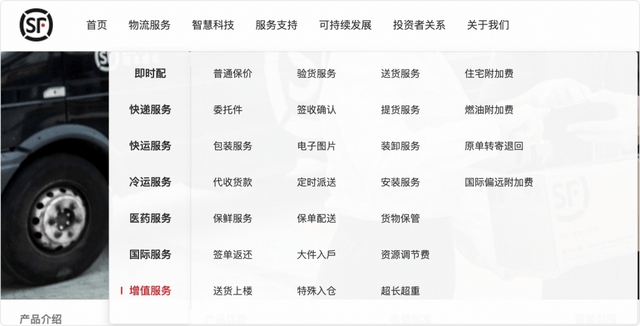
The “Eye of the Storm” of Phoenix.com also found that in addition to SF Express, YTO Express, Zhongtong, and JD Express have also launched various “value-added services” in recent years. However, only SF’s value-added services have “receipt confirmation”.
According to the official website of JD Express, it currently provides value-added services for collection of goods and return of orders. The official website shows that the value-added services that can be provided include professional packaging, temporary storage services, and insured services.
The order page of Zhongtong provides security numbers and value-added services of payment collection. The value-added services marked on Zhongtong’s official website include price insured, signed return, freight collect, and payment collection.
YTO’s order page only has the function of insuring. The official website shows that the value-added services provided include payment collection, pickup, return of orders and insured services.
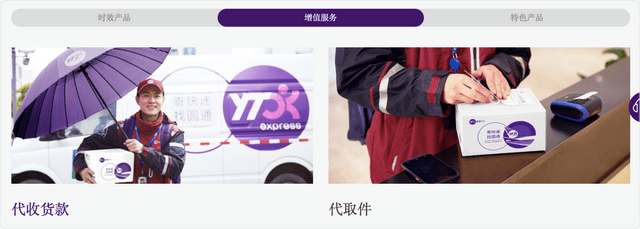
Internet industry commentator and columnist Zhang Shule of People’s Daily said to Phoenix.com’s “Eye of the Storm”: “The core of value-added services is not provided by the entire industry or not in the previous contract. It is a project that provides consumers with a higher express logistics experience. These are relatively low frequency items that increase the extra cost of the express company, such as repeatedly changing the express address, expedited delivery, etc., which are characterized by user-selected actions.”
However, whether it is other value-added services of SF Express or the value-added services of other express companies, it has not aroused too much controversy before. Why is the “signature confirmation” so controversial this time?
Zhang Shule said: “The receipt confirmation is one of the service contents of the express company, and the last procedure of the last mile. Value-added services are not in the prescribed actions of the express service, blocking some points or links, such as door-to-door delivery and receipt confirmation. The costs will be shared equally on the users again. If it is not an optional action, it is an infringement of consumer rights and interests. This kind of additional’toll booths’ should be regarded as a monopoly and should be rectified.”
In fact, whether it is a “collective price increase” or a variety of “value-added services”, express companies such as SF Express are trying to reduce costs and increase revenue under the pressure of performance.
Zhang Shule believes that the express delivery companies are currently entering a development bottleneck, and they are unable to compete with each other as “ones.” However, after the price drops, it is against the market principle to achieve cost dilution and profitability through price increases, cleverly established name charges and other methods.
“It really wants to enter the next match point, and the core is to complete its own subversive innovation, that is, from a labor-intensive field to a labor-intensive industry supported by big data, cloud computing and artificial intelligence, and achieve another flat channel. Further downward adjustments of chemical and price.” Zhang Shule said.
An industry insider said to Phoenix.com “Eye of the Storm”: “The reason why express companies launch various value-added services is to open diversified and customized services and expand their own revenue channels. This is also under the pressure of price wars. One of the more feasible ways. But at present, this part of the income is only a fraction of a fraction, and it is not enough to have a big impact on the overall revenue.”
In fact, there is market demand for “value-added services”. A number of interviewees told Phoenix.com’s “Eye of the Storm” that, for example, large-scale household entry, price insured, and fresh-keeping services are not commonly used, but they are indeed used. Such services should be charged extra.
However, “value-added services” cannot cross the line, otherwise it will cause consumers to resent, and the gains outweigh the losses.
As the Beijing Youth Daily commented: “Express delivery companies such as SF Express take their statutory obligation to allow recipients to check and accept them in person and turn them into a fee-based value-added service without authorization. This is not really clever but a small trick.”
The Beijing Youth Daily article pointed out that for the special needs of a small number of customers, on the premise of not violating current regulations, express companies should provide personalized services instead of launching a unified “signature confirmation” fee-added value-added service. What needs to be particularly vigilant is that express delivery companies use “industry common practices” and “customers have demand” as an excuse to conceal the illegality of arbitrary charges.Return to Sohu to see more
.